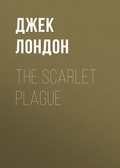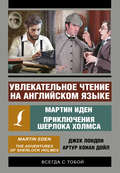
Джек Лондон
Мартин Иден / Martin Eden
Chapter XLIV
Mr. Morse met Martin in the office of the Hotel Metropole. Whether he had happened there just casually, intent on other affairs, or whether he had come there for the direct purpose of inviting him to dinner, Martin never could quite make up his mind, though he inclined toward the second hypothesis. At any rate, invited to dinner he was by Mr. Morse-Ruth’s father, who had forbidden him the house and broken off the engagement.
Martin was not angry. He was not even on his dignity. He tolerated Mr. Morse, wondering the while how it felt to eat such humble pie. He did not decline the invitation. Instead, he put it off with vagueness and indefiniteness and inquired after the family, particularly after Mrs. Morse and Ruth. He spoke her name without hesitancy, naturally, though secretly surprised that he had had no inward quiver, no old, familiar increase of pulse and warm surge of blood.
He had many invitations to dinner, some of which he accepted. Persons got themselves introduced to him in order to invite him to dinner. And he went on puzzling over the little thing that was becoming a great thing. Bernard Higginbotham invited him to dinner. He puzzled the harder. He remembered the days of his desperate starvation when no one invited him to dinner. That was the time he needed dinners, and went weak and faint for lack of them and lost weight from sheer famine. That was the paradox of it. When he wanted dinners, no one gave them to him, and now that he could buy a hundred thousand dinners and was losing his appetite, dinners were thrust upon him right and left. But why? There was no justice in it, no merit on his part. He was no different. All the work he had done was even at that time work performed. Mr. and Mrs. Morse had condemned him for an idler and a shirk and through Ruth had urged that he take a clerk’s position in an office. Furthermore, they had been aware of his work performed. Manuscript after manuscript of his had been turned over to them by Ruth. They had read them. It was the very same work that had put his name in all the papers, and, it was his name being in all the papers that led them to invite him.
One thing was certain: the Morses had not cared to have him for himself or for his work. Therefore they could not want him now for himself or for his work, but for the fame that was his, because he was somebody amongst men, and-why not?-because he had a hundred thousand dollars or so. That was the way bourgeois society valued a man, and who was he to expect it otherwise? But he was proud. He disdained such valuation. He desired to be valued for himself, or for his work, which, after all, was an expression of himself. That was the way Lizzie valued him. The work, with her, did not even count. She valued him, himself. That was the way Jimmy, the plumber, and all the old gang valued him. That had been proved often enough in the days when he ran with them; it had been proved that Sunday at Shell Mound Park. His work could go hang. What they liked, and were willing to scrap for, was just Mart Eden, one of the bunch and a pretty good guy.
Then there was Ruth. She had liked him for himself, that was indisputable. And yet, much as she had liked him she had liked the bourgeois standard of valuation more. She had opposed his writing, and principally, it seemed to him, because it did not earn money. That had been her criticism of his «Love-cycle.» She, too, had urged him to get a job. It was true, she refined it to «position,» but it meant the same thing, and in his own mind the old nomenclature stuck. He had read her all that he wrote-poems, stories, essays-«Wiki-Wiki», «The Shame of the Sun,» everything. And she had always and consistently urged him to get a job, to go to work-good God!-as if he hadn’t been working, robbing sleep, exhausting life, in order to be worthy of her.
So the little thing grew bigger. He was healthy and normal, ate regularly, slept long hours, and yet the growing little thing was becoming an obsession. Work performed. The phrase haunted his brain. He sat opposite Bernard Higginbotham at a heavy Sunday dinner over Higginbotham’s Cash Store, and it was all he could do to restrain himself from shouting out:
«It was work performed! And now you feed me, when then you let me starve, forbade me your house, and damned me because I wouldn’t get a job. And the work was already done, all done. And now, when I speak, you check the thought unuttered on your lips and hang on my lips and pay respectful attention to whatever I choose to say. I tell you your party is rotten and filled with grafters, and instead of flying into a rage you hum and haw and admit there is a great deal in what I say. And why? Because I’m famous; because I’ve a lot of money. Not because I’m Martin Eden, a pretty good fellow and not particularly a fool. I could tell you the moon is made of green cheese and you would subscribe to the notion, at least you would not repudiate it, because I’ve got dollars, mountains of them. And it was all done long ago; it was work performed, I tell you, when you spat upon me as the dirt under your feet.»
But Martin did not shout out. The thought gnawed in his brain, an unceasing torment, while he smiled and succeeded in being tolerant. As he grew silent, Bernard Higginbotham got the reins and did the talking. He was a success himself, and proud of it. He was self-made. No one had helped him. He owed no man. He was fulfilling his duty as a citizen and bringing up a large family. And there was Higginbotham’s Cash Store, that monument of his own industry and ability. He loved Higginbotham’s Cash Store as some men loved their wives. He opened up his heart to Martin, showed with what keenness and with what enormous planning he had made the store. And he had plans for it, ambitious plans. The neighborhood was growing up fast. The store was really too small. If he had more room, he would be able to put in a score of labor-saving and money-saving improvements. And he would do it yet. He was straining every effort for the day when he could buy the adjoining lot and put up another two-story frame building. The upstairs he could rent, and the whole ground-floor of both buildings would be Higginbotham’s Cash Store. His eyes glistened when he spoke of the new sign that would stretch clear across both buildings.
Martin forgot to listen. The refrain of «Work performed,» in his own brain, was drowning the other’s clatter. The refrain maddened him, and he tried to escape from it.
«How much did you say it would cost?» he asked suddenly.
His brother-in-law paused in the middle of an expatiation on the business opportunities of the neighborhood. He hadn’t said how much it would cost. But he knew. He had figured it out a score of times.
«At the way lumber is now,» he said, «four thousand could do it.»
«Including the sign?»
«I didn’t count on that. It’d just have to come, onc’t the buildin’ was there.»
«And the ground?»
«Three thousand more.»
He leaned forward, licking his lips, nervously spreading and closing his fingers, while he watched Martin write a check. When it was passed over to him, he glanced at the amount-seven thousand dollars.
«I– I can’t afford to pay more than six per cent,» he said huskily.
Martin wanted to laugh, but, instead, demanded:
«How much would that be?»
«Lemme see. Six per cent-six times seven-four hundred an’ twenty.»
«That would be thirty-five dollars a month, wouldn’t it?»
Higginbotham nodded.
«Then, if you’ve no objection, well arrange it this way.» Martin glanced at Gertrude. «You can have the principal to keep for yourself, if you’ll use the thirty-five dollars a month for cooking and washing and scrubbing. The seven thousand is yours if you’ll guarantee that Gertrude does no more drudgery. Is it a go?»
Mr. Higginbotham swallowed hard. That his wife should do no more housework was an affront to his thrifty soul. The magnificent present was the coating of a pill, a bitter pill. That his wife should not work! It gagged him.
«All right, then,» Martin said. «I’ll pay the thirty-five a month, and-»
He reached across the table for the check. But Bernard Higginbotham got his hand on it first, crying:
«I accept! I accept!»
When Martin got on the electric car, he was very sick and tired. He looked up at the assertive sign.
«The swine,» he groaned. «The swine, the swine.»
When Mackintosh’s Magazine published «The Palmist,» featuring it with decorations by Berthier and with two pictures by Wenn, Hermann von Schmidt forgot that he had called the verses obscene. He announced that his wife had inspired the poem, saw to it that the news reached the ears of a reporter, and submitted to an interview by a staff writer who was accompanied by a staff photographer and a staff artist. The result was a full page in a Sunday supplement, filled with photographs and idealized drawings of Marian, with many intimate details of Martin Eden and his family, and with the full text of «The Palmist» in large type, and republished by special permission of Mackintosh’s Magazine. It caused quite a stir in the neighborhood, and good housewives were proud to have the acquaintances of the great writer’s sister, while those who had not made haste to cultivate it. Hermann von Schmidt chuckled in his little repair shop and decided to order a new lathe. «Better than advertising,» he told Marian, «and it costs nothing.»
«We’d better have him to dinner,» she suggested.
And to dinner Martin came, making himself agreeable with the fat wholesale butcher and his fatter wife-important folk, they, likely to be of use to a rising young man like Hermann Von Schmidt. No less a bait, however, had been required to draw them to his house than his great brother-in-law. Another man at table who had swallowed the same bait was the superintendent of the Pacific Coast agencies for the Asa Bicycle Company. Him Von Schmidt desired to please and propitiate because from him could be obtained the Oakland agency for the bicycle. So Hermann von Schmidt found it a goodly asset to have Martin for a brother-in-law, but in his heart of hearts he couldn’t understand where it all came in. In the silent watches of the night, while his wife slept, he had floundered through Martin’s books and poems, and decided that the world was a fool to buy them.
And in his heart of hearts Martin understood the situation only too well, as he leaned back and gloated at Von Schmidt’s head, in fancy punching it well-nigh off of him, sending blow after blow home just right-the chuckle-headed Dutchman! One thing he did like about him, however. Poor as he was, and determined to rise as he was, he nevertheless hired one servant to take the heavy work off of Marian’s hands. Martin talked with the superintendent of the Asa agencies, and after dinner he drew him aside with Hermann, whom he backed financially for the best bicycle store with fittings in Oakland. He went further, and in a private talk with Hermann told him to keep his eyes open for an automobile agency and garage, for there was no reason that he should not be able to run both establishments successfully.
With tears in her eyes and her arms around his neck, Marian, at parting, told Martin how much she loved him and always had loved him. It was true, there was a perceptible halt midway in her assertion, which she glossed over with more tears and kisses and incoherent stammerings, and which Martin inferred to be her appeal for forgiveness for the time she had lacked faith in him and insisted on his getting a job.
«He can’t never keep his money, that’s sure,» Hermann von Schmidt confided to his wife. «He got mad when I spoke of interest, an’ he said damn the principal and if I mentioned it again, he’d punch my Dutch head off. That’s what he said-my Dutch head. But he’s all right, even if he ain’t no business man. He’s given me my chance, an’ he’s all right.»
Invitations to dinner poured in on Martin; and the more they poured, the more he puzzled. He sat, the guest of honor, at an Arden Club banquet, with men of note whom he had heard about and read about all his life; and they told him how, when they had read «The Ring of Bells» in the Transcontinental, and «The Peri and the Pearl» in The Hornet, they had immediately picked him for a winner. My God! and I was hungry and in rags, he thought to himself. Why didn’t you give me a dinner then? Then was the time. It was work performed. If you are feeding me now for work performed, why did you not feed me then when I needed it? Not one word in «The Ring of Bells,» nor in «The Peri and the Pearl» has been changed. No; you’re not feeding me now for work performed. You are feeding me because everybody else is feeding me and because it is an honor to feed me. You are feeding me now because you are herd animals; because you are part of the mob; because the one blind, automatic thought in the mob-mind just now is to feed me. And where does Martin Eden and the work Martin Eden performed come in in all this? he asked himself plaintively, then arose to respond cleverly and wittily to a clever and witty toast.
So it went. Wherever he happened to be-at the Press Club, at the Redwood Club, at pink teas and literary gatherings-always were remembered «The Ring of Bells» and «The Peri and the Pearl» when they were first published. And always was Martin’s maddening and unuttered demand: Why didn’t you feed me then? It was work performed. «The Ring of Bells» and «The Peri and the Pearl» are not changed one iota. They were just as artistic, just as worth while, then as now. But you are not feeding me for their sake, nor for the sake of anything else I have written. You’re feeding me because it is the style of feeding just now, because the whole mob is crazy with the idea of feeding Martin Eden.
And often, at such times, he would abruptly see slouch in among the company a young hoodlum in square-cut coat and under a stiff-rim Stetson hat. It happened to him at the Gallina Society in Oakland one afternoon. As he rose from his chair and stepped forward across the platform, he saw stalk through the wide door at the rear of the great room the young hoodlum with the square-cut coat and stiff-rim hat. Five hundred fashionably gowned women turned their heads, so intent and steadfast was Martin’s gaze, to see what he was seeing. But they saw only the empty centre aisle. He saw the young tough lurching down that aisle and wondered if he would remove the stiff-rim which never yet had he seen him without. Straight down the aisle he came, and up the platform. Martin could have wept over that youthful shade of himself, when he thought of all that lay before him. Across the platform he swaggered, right up to Martin, and into the foreground of Martin’s consciousness disappeared. The five hundred women applauded softly with gloved hands, seeking to encourage the bashful great man who was their guest. And Martin shook the vision from his brain, smiled, and began to speak.
The Superintendent of Schools, good old man, stopped Martin on the street and remembered him, recalling seances in his office when Martin was expelled from school for fighting.
«I read your ‘Ring of Bells’ in one of the magazines quite a time ago,» he said. «It was as good as Poe. Splendid, I said at the time, splendid!»
Yes, and twice in the months that followed you passed me on the street and did not know me, Martin almost said aloud. Each time I was hungry and heading for the pawnbroker. Yet it was work performed. You did not know me then. Why do you know me now?
«I was remarking to my wife only the other day,» the other was saying, «wouldn’t it be a good idea to have you out to dinner some time? And she quite agreed with me. Yes, she quite agreed with me.»
«Dinner?» Martin said so sharply that it was almost a snarl.
«Why, yes, yes, dinner, you know-just pot luck with us, with your old superintendent, you rascal,» he uttered nervously, poking Martin in an attempt at jocular fellowship.
Martin went down the street in a daze. He stopped at the corner and looked about him vacantly.
«Well, I’ll be damned!» he murmured at last. «The old fellow was afraid of me.»
Chapter XLV
Kreis came to Martin one day-Kreis, of the «real dirt»; and Martin turned to him with relief, to receive the glowing details of a scheme sufficiently wild-catty to interest him as a fictionist rather than an investor. Kreis paused long enough in the midst of his exposition to tell him that in most of his «Shame of the Sun» he had been a chump.
«But I didn’t come here to spout philosophy,» Kreis went on. «What I want to know is whether or not you will put a thousand dollars in on this deal?»
«No, I’m not chump enough for that, at any rate,» Martin answered. «But I’ll tell you what I will do. You gave me the greatest night of my life. You gave me what money cannot buy. Now I’ve got money, and it means nothing to me. I’d like to turn over to you a thousand dollars of what I don’t value for what you gave me that night and which was beyond price. You need the money. I’ve got more than I need. You want it. You came for it. There’s no use scheming it out of me. Take it.»
Kreis betrayed no surprise. He folded the check away in his pocket.
«At that rate I’d like the contract of providing you with many such nights,» he said.
«Too late.» Martin shook his head. «That night was the one night for me. I was in paradise. It’s commonplace with you, I know. But it wasn’t to me. I shall never live at such a pitch again. I’m done with philosophy. I want never to hear another word of it.»
«The first dollar I ever made in my life out of my philosophy,» Kreis remarked, as he paused in the doorway. «And then the market broke.»
Mrs. Morse drove by Martin on the street one day, and smiled and nodded. He smiled back and lifted his hat. The episode did not affect him. A month before it might have disgusted him, or made him curious and set him to speculating about her state of consciousness at that moment. But now it was not provocative of a second thought. He forgot about it the next moment. He forgot about it as he would have forgotten the Central Bank Building or the City Hall after having walked past them. Yet his mind was preternaturally active. His thoughts went ever around and around in a circle. The centre of that circle was «work performed»; it ate at his brain like a deathless maggot. He awoke to it in the morning. It tormented his dreams at night. Every affair of life around him that penetrated through his senses immediately related itself to «work performed.» He drove along the path of relentless logic to the conclusion that he was nobody, nothing. Mart Eden, the hoodlum, and Mart Eden, the sailor, had been real, had been he; but Martin Eden! the famous writer, did not exist. Martin Eden, the famous writer, was a vapor that had arisen in the mob-mind and by the mob-mind had been thrust into the corporeal being of Mart Eden, the hoodlum and sailor. But it couldn’t fool him. He was not that sun-myth that the mob was worshipping and sacrificing dinners to. He knew better.
He read the magazines about himself, and pored over portraits of himself published therein until he was unable to associate his identity with those portraits. He was the fellow who had lived and thrilled and loved; who had been easy-going and tolerant of the frailties of life; who had served in the forecastle, wandered in strange lands, and led his gang in the old fighting days. He was the fellow who had been stunned at first by the thousands of books in the free library, and who had afterward learned his way among them and mastered them; he was the fellow who had burned the midnight oil and bedded with a spur and written books himself. But the one thing he was not was that colossal appetite that all the mob was bent upon feeding.
There were things, however, in the magazines that amused him. All the magazines were claiming him. Warren’s Monthly advertised to its subscribers that it was always on the quest after new writers, and that, among others, it had introduced Martin Eden to the reading public. The White Mouse claimed him; so did The Northern Review and Mackintosh’s Magazine, until silenced by The Globe, which pointed triumphantly to its files where the mangled «Sea Lyrics» lay buried. Youth and Age, which had come to life again after having escaped paying its bills, put in a prior claim, which nobody but farmers’ children ever read. The Transcontinental made a dignified and convincing statement of how it first discovered Martin Eden, which was warmly disputed by The Hornet, with the exhibit of «The Peri and the Pearl.» The modest claim of Singletree, Darnley Co. was lost in the din. Besides, that publishing firm did not own a magazine wherewith to make its claim less modest.
The newspapers calculated Martin’s royalties. In some way the magnificent offers certain magazines had made him leaked out, and Oakland ministers called upon him in a friendly way, while professional begging letters began to clutter his mail. But worse than all this were the women. His photographs were published broadcast, and special writers exploited his strong, bronzed face, his scars, his heavy shoulders, his clear, quiet eyes, and the slight hollows in his cheeks like an ascetic’s. At this last he remembered his wild youth and smiled. Often, among the women he met, he would see now one, now another, looking at him, appraising him, selecting him. He laughed to himself. He remembered Brissenden’s warning and laughed again. The women would never destroy him, that much was certain. He had gone past that stage.
Once, walking with Lizzie toward night school, she caught a glance directed toward him by a well-gowned, handsome woman of the bourgeoisie. The glance was a trifle too long, a shade too considerative. Lizzie knew it for what it was, and her body tensed angrily. Martin noticed, noticed the cause of it, told her how used he was becoming to it and that he did not care anyway.
«You ought to care,» she answered with blazing eyes. «You’re sick. That’s what’s the matter.»
«Never healthier in my life. I weigh five pounds more than I ever did.»
«It ain’t your body. It’s your head. Something’s wrong with your think-machine. Even I can see that, an’ I ain’t nobody.»
He walked on beside her, reflecting.
«I’d give anything to see you get over it,» she broke out impulsively. «You ought to care when women look at you that way, a man like you. It’s not natural. It’s all right enough for sissy-boys. But you ain’t made that way. So help me, I’d be willing an’ glad if the right woman came along an’ made you care.»
When he left Lizzie at night school, he returned to the Metropole.
Once in his rooms, he dropped into a Morris chair and sat staring straight before him. He did not doze. Nor did he think. His mind was a blank, save for the intervals when unsummoned memory pictures took form and color and radiance just under his eyelids. He saw these pictures, but he was scarcely conscious of them-no more so than if they had been dreams. Yet he was not asleep. Once, he roused himself and glanced at his watch. It was just eight o’clock. He had nothing to do, and it was too early for bed. Then his mind went blank again, and the pictures began to form and vanish under his eyelids. There was nothing distinctive about the pictures. They were always masses of leaves and shrub-like branches shot through with hot sunshine.
A knock at the door aroused him. He was not asleep, and his mind immediately connected the knock with a telegram, or letter, or perhaps one of the servants bringing back clean clothes from the laundry. He was thinking about Joe and wondering where he was, as he said, “Come in.”
He was still thinking about Joe, and did not turn toward the door. He heard it close softly. There was a long silence. He forgot that there had been a knock at the door, and was still staring blankly before him when he heard a woman’s sob. It was involuntary, spasmodic, checked, and stifled-he noted that as he turned about. The next instant he was on his feet.
“Ruth!” he said, amazed and bewildered.
Her face was white and strained. She stood just inside the door, one hand against it for support, the other pressed to her side. She extended both hands toward him piteously, and started forward to meet him. As he caught her hands and led her to the Morris chair he noticed how cold they were. He drew up another chair and sat down on the broad arm of it. He was too confused to speak. In his own mind his affair with Ruth was closed and sealed. He felt much in the same way that he would have felt had the Shelly Hot Springs Laundry suddenly invaded the Hotel Metropole with a whole week’s washing ready for him to pitch into. Several times he was about to speak, and each time he hesitated.
“No one knows I am here,” Ruth said in a faint voice, with an appealing smile.
“What did you say?”
He was surprised at the sound of his own voice.
She repeated her words.
“Oh,” he said, then wondered what more he could possibly say.
“I saw you come in, and I waited a few minutes.”
“Oh,” he said again.
He had never been so tongue-tied in his life. Positively he did not have an idea in his head. He felt stupid and awkward, but for the life of him he could think of nothing to say. It would have been easier had the intrusion been the Shelly Hot Springs laundry. He could have rolled up his sleeves and gone to work.
“And then you came in,” he said finally.
She nodded, with a slightly arch expression, and loosened the scarf at her throat.
“I saw you first from across the street when you were with that girl.”
“Oh, yes,” he said simply. “I took her down to night school.”
“Well, aren’t you glad to see me?” she said at the end of another silence.
“Yes, yes.” He spoke hastily. “But wasn’t it rash of you to come here?”
“I slipped in. Nobody knows I am here. I wanted to see you. I came to tell you I have been very foolish. I came because I could no longer stay away, because my heart compelled me to come, because-because I wanted to come.”
She came forward, out of her chair and over to him. She rested her hand on his shoulder a moment, breathing quickly, and then slipped into his arms. And in his large, easy way, desirous of not inflicting hurt, knowing that to repulse this proffer of herself was to inflict the most grievous hurt a woman could receive, he folded his arms around her and held her close. But there was no warmth in the embrace, no caress in the contact. She had come into his arms, and he held her, that was all. She nestled against him, and then, with a change of position, her hands crept up and rested upon his neck. But his flesh was not fire beneath those hands, and he felt awkward and uncomfortable.
“What makes you tremble so?” he asked. “Is it a chill? Shall I light the grate?”
He made a movement to disengage himself, but she clung more closely to him, shivering violently.
“It is merely nervousness,” she said with chattering teeth. “I’ll control myself in a minute. There, I am better already.”
Slowly her shivering died away. He continued to hold her, but he was no longer puzzled. He knew now for what she had come.
“My mother wanted me to marry Charley Hapgood,” she announced.
“Charley Hapgood, that fellow who speaks always in platitudes?” Martin groaned. Then he added, “And now, I suppose, your mother wants you to marry me.”
He did not put it in the form of a question. He stated it as a certitude, and before his eyes began to dance the rows of figures of his royalties.
“She will not object, I know that much,” Ruth said.
“She considers me quite eligible?”
Ruth nodded.
“And yet I am not a bit more eligible now than I was when she broke our engagement,” he meditated. “I haven’t changed any. I’m the same Martin Eden, though for that matter I’m a bit worse-I smoke now. Don’t you smell my breath?”
In reply she pressed her open fingers against his lips, placed them graciously and playfully, and in expectancy of the kiss that of old had always been a consequence. But there was no caressing answer of Martin’s lips. He waited until the fingers were removed and then went on.
“I am not changed. I haven’t got a job. I’m not looking for a job. Furthermore, I am not going to look for a job. And I still believe that Herbert Spencer is a great and noble man and that Judge Blount is an unmitigated ass. I had dinner with him the other night, so I ought to know.”
“But you didn’t accept father’s invitation,” she chided.
“So you know about that? Who sent him? Your mother?”
She remained silent.
“Then she did send him. I thought so. And now I suppose she has sent you.”
“No one knows that I am here,” she protested. “Do you think my mother would permit this?”
“She’d permit you to marry me, that’s certain.”
She gave a sharp cry. “Oh, Martin, don’t be cruel. You have not kissed me once. You are as unresponsive as a stone. And think what I have dared to do.” She looked about her with a shiver, though half the look was curiosity. «Just think of where I am.»
«I could die for you! I could die for you!»–Lizzie’s words were ringing in his ears.
“Why didn’t you dare it before?” he asked harshly. “When I hadn’t a job? When I was starving? When I was just as I am now, as a man, as an artist, the same Martin Eden? That’s the question I’ve been propounding to myself for many a day-not concerning you merely, but concerning everybody. You see I have not changed, though my sudden apparent appreciation in value compels me constantly to reassure myself on that point. I’ve got the same flesh on my bones, the same ten fingers and toes. I am the same. I have not developed any new strength nor virtue. My brain is the same old brain. I haven’t made even one new generalization on literature or philosophy. I am personally of the same value that I was when nobody wanted me. And what is puzzling me is why they want me now. Surely they don’t want me for myself, for myself is the same old self they did not want. Then they must want me for something else, for something that is outside of me, for something that is not I! Shall I tell you what that something is? It is for the recognition I have received. That recognition is not I. It resides in the minds of others. Then again for the money I have earned and am earning. But that money is not I. It resides in banks and in the pockets of Tom, Dick, and Harry. And is it for that, for the recognition and the money, that you now want me?”







